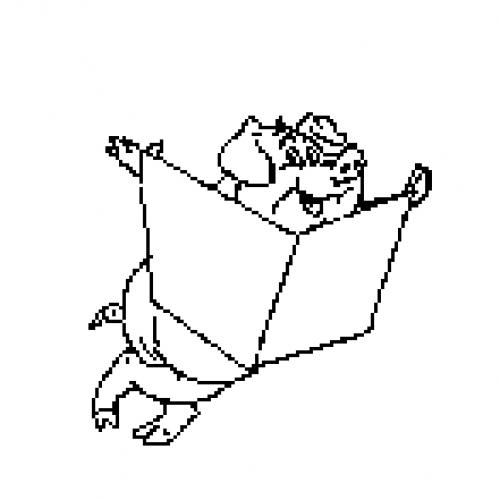Copy Link
Add to Bookmark
Report
Pig Genome Newsletter #099

From: "Rothschild, Max F [AN S]" <mfrothsc@iastate.edu>
To: angenmap@animalgenome.org
Subject: US Pig Genome Newsletter #099
Date: Mon, 26 Oct 2009 09:26:50 -0500
Pig Genome Update # 99:
- PDF version is available at
http://www.animalgenome.org/pigs/newsletter/pdf/No.099.pdf
- Web version is available at
http://www.animalgenome.org/pigs/newsletter/No.099.html
- Plain text version is appended below:
P I G G E N O M E U P D A T E
__________________________________________________________________
A Bimonthly Newsletter of the U.S. Pig Genome Coordination Program
************** No. 99 **************
* *
* <angenmap@animalgenome.org> *
* November 1, 2009 *
**************************************
===========================================================================
1. Swine sequencing draft sequence about to be completed
2. We owe a big thanks to all the many contributors, and all those within
the field that have helped at Sanger and around the world to get us to
that point.
3. Refunding of the NRSP8 requires some help from each of you
4. Recent Gene Nomenclature meeting provides some new direction
5. VC Map recently released
6. Dreaming of San Diego and PAG? Time is coming up to submit the abstracts
7. Pig Genome Update Newsletters are distributed electronically
8. Upcoming meetings ( 4 items )
===========================================================================
Swine sequencing draft sequence about to be completed. The deadline has
passed for new clones to enter the sequencing pipeline. However, some new
clones are being identified as a possible resource for future sequence gap
closure. These identified BACs currently stand at ~150 and have been
identified using physical map and sequence information. All chromosomes
are over 90% sequenced taking the genome to 95.58% from 16,664 sequenced
clones. About 89% of the genome is at the "Improved" status (15,286
clones). There is 114 MB of finished quality data within the 2.973Gb
currently available (kindly provided by Richard Clark).
o o o o o o o o o o o
We owe a big thanks to all the many contributors, and all those within the
field that have helped at Sanger and around the world to get us to that
point. Many people raised money, contributed time and efforts and have
helped over the years. The Pig Genome III meeting in the UK in November
is in part a celebration of this activity and all are encouraged to attend
if possible. The next issue will try to cover some of the accomplishments
from the meeting.
o o o o o o o o o o o
Refunding of the NRSP8 requires some help from each of you. We are
continually asked what the coordinators money does. Many of you have
received reagents, arrays, SNP chip and some of this has been augmented by
funds from coordinator activities. Please send by December 1, 2009 to
mfrothsc@iastate.edu any grant titles and dollar amounts for the past 3
years for any project helped by reagents, tools and bioinformatics in part
supplied by the Pig genome Coordination program.
o o o o o o o o o o o
Recent Gene Nomenclature meeting provides some new direction. With the
completion or soon to be completion of a number of genome sequencing
projects, a number of challenges arise. Recently, representatives from
the human, mouse, rat, cattle, chicken, swine, sheep, and aquaculture
communities along with database and complex gene family representatives
met in Cambridge, UK to discuss gene nomenclature issues. Previously, the
livestock communities had agreed that the human gene nomenclature rules
would be followed. This point was reaffirmed at the meeting. However, in
cases where either clade-specific genes or even species-specific genes are
to be named, a domesticated animal gene nomenclature committee (ie.
cattle, dog, horse, sheep, and swine) needs to be formed to coordinate
efforts. It is hoped that this topic is discussed with the respective
species at the up-coming Plant and Animal Genome and International Society
of Animal Genetics meetings (kindly provided by James Reecy).
o o o o o o o o o o o
VC Map recently released. As part of a collaborative project, between Jim
Reecy and Zhiliang Hu at AnimalGenome.org and Mary Shimoyama and Anne
Kwitek from the Rat Genome Database, version 1 of VCMap has been released.
This visualization program has been developed to compare chromosome
organization across species (currently cattle, chicken, human, mouse, rat
and swine). The current release utilizes the swine USDA linkage map and
chromosome 1, 4, 5, 7, 11, 13, and 14. The entire swine genome will be
added shortly. Please take a look at VCMap (http://bioneos.com/VCMap/)
and provide feedback (jreecy@iastate.edu or zhu@iastate.edu) on additional
features that you would like to see added (kindly provided by James
Reecy).
o o o o o o o o o o o
Dreaming of San Diego and PAG? Time is coming up to submit the abstracts
and plan for next year. See http://www.intl-pag.org/ for more information.
Scheduled PAG XVIII plenary speakers include Eric Schadt, Peter Raven,
Howard Jacob, Evan Eichler, Joanne Chory, Robb Fraley and Vicki Chandler.
It promises to be a great meeting. Cathy Ernst (ernstc@msu.edu) is
organizing the Swine workshop for January 9.
o o o o o o o o o o o
Pig Genome Update Newsletters are distributed electronically through AnGenMap,
the Animal Genome Discussion Group (http://www.animalgenome.org/community/discuss).
Previous newsletters are at http://www.animalgenome.org/pigs/newsletter/index.html.
Coordinator updates can also be found http://www.animalgenome.org/pigs/community/NRSP8/.
Please provide your input as the Swine Genome Coordinator is always glad to
hear from NRSP-8 members and other readers about ways that we can improve the
coordination effort or provide resources that are needed and with which we may
be able to help. Also, let us know if you have items of general interest to
include in this Newsletter.
o o o o o o o o o o o
Upcoming meetings (see:
http://www.animalgenome.org/pigs/community/meetings.html)
Swine Genome Sequencing Consortium (SGSC) and Pig Genome III in Hinxton,
UK November 2-4. Please see http://www.pignet.eu/conferences/pig-genome-iii/
or contact either Larry Schook (schook@illinois.edu) or Martien Groenen
(Martien.Groenen@wur.nl).
National Swine Improvement federation meeting December 2-4, Nashville TN.
For details please email Glenn Conatser (glennhelen@gmail.com).
PRRS Friday Dec.4-Sat Dec.5. For details got to http://www.prrssymposium.org/
for all info.
Plant & Animal Genome Conference, PAG XVIII, Jan. 9-13, 2010, Town & Country
Hotel, San Diego, CA. Information available at http://www.intl-pag.org/.
<> <> <> <> <> <> <> <> <> <> <>
Items for Pig Genome Update 100 can be sent to me by no later than December 15
please.
Max Rothschild
U.S. Pig Genome Coordinator
2255 Kildee Hall, Department of Animal Science
Iowa State University
Ames, Iowa 50011
Phone: 515-294-6202, Fax: 515-294-2401
mfrothsc@iastate.edu
http://www.animalgenome.org/pigs/
cc: Muquarrab Qureshi, CSREES and Caird Rexroad II, ARS
===========================================================================
U.S. PIG GENOME COORDINATION PROJECT
+-----------------------------------+
| Paid for by funds from the NRSP-8 | Web: http://www.animalgenome.org/pig
| USDA/CSREES sponsored Pig Genome | Mail: angenmap@animalgenome.org
| Coordination Program |
+-----------------------------------+--------------------------------------






















